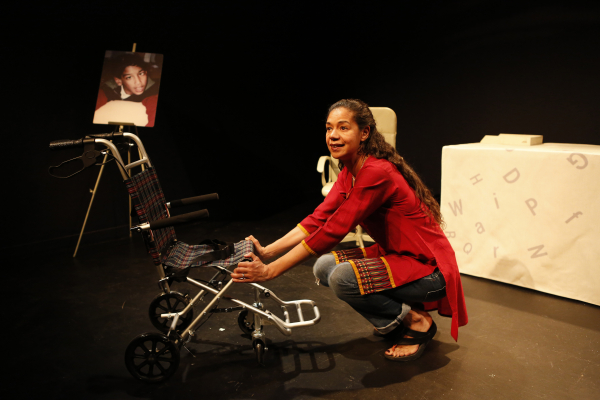Don't Wake Me: The Ballad of Nihal Armstrong

(© Carol Rosegg)
"Scheherazade told endless stories to keep herself alive. From that ether of unborn souls, my keen words too will strive to tease you into existence and help me to survive."
A grieving mother's confession, celebration, tears, laughter, regret, joy, and everything in between follow this preface to Rahila Gupta's one-woman show Don't Wake Me: The Ballad of Nihal Armstrong, now playing at 59E59 Theaters as part of the Brits Off-Broadway Festival. Gupta has penned an hour-long autobiographical poetic catharsis that captures the victories and defeats of her life with her son Nihal — a victim of cerebral palsy who died at the early age of 17.
Directed by Guy Slater and performed by the stately Jaye Griffiths, the piece becomes more of an ode than a ballad. Griffiths addresses the lush stanzas directly to Nihal, whose presence, as time passes, is represented by a bassinet, two different wheelchairs, and a portrait of him that stands on an easel for the duration of the play. She recounts their entire life together, beginning with the gruesome details of his birth like a beaming mother sharing the lore of her child's magical entrance into the world — the gushing stories that are known to make children cringe with embarrassment.
As the piece continues past Nihal's heartbreaking diagnosis with cerebral palsy, his ongoing struggles through the educational system, and his unrelenting medical setbacks, the play solidifies its amorphous shape as an emotional kitchen sink, offering an outlet for a mother unable to sort out the myriad of emotions that come along with such a debilitating experience. Griffiths does an impeccable job carrying the weight of the play on her back. She dives headfirst into this rollercoaster of emotional peaks and valleys, landing the immensity of them all while also doing service to the aural nature of Gupta's prose. The captivating clarity of her voice meets the demands of Gupta's sweeping language, evoking the crisp delivery of a Shakespearean monologue. Slater directs the minimalist work with an equally slight hand, allowing Gupta's words to ring clearly through Griffiths' performance. The few props he includes help set the scene and offer the actress a semblance of a scene partner, as Griffiths plays off of the elements standing in for her character's tragically absent son.
First and foremost a work of poetry, Don't Wake Me does not find its natural habitat onstage. Despite Griffiths' powerful delivery and physical embodiment of Gupta's story, the experience remains a literary one. The language is stunning and densely packed with too many elaborate metaphors for the ear alone to catch the first time around. Audiences would be well-served to return to the piece in print to explore its verbal nuances and delve even deeper into the conflicting feelings of love, guilt, empowerment, and helplessness that the story traverses. Though not a match made in heaven, the theatrical presentation is not without its own value. As Gupta recalls in her allusion to the story of the legendary Persian queen Scheherazade, each performance of this staged ballad offers both she and her son another joyous birth.











